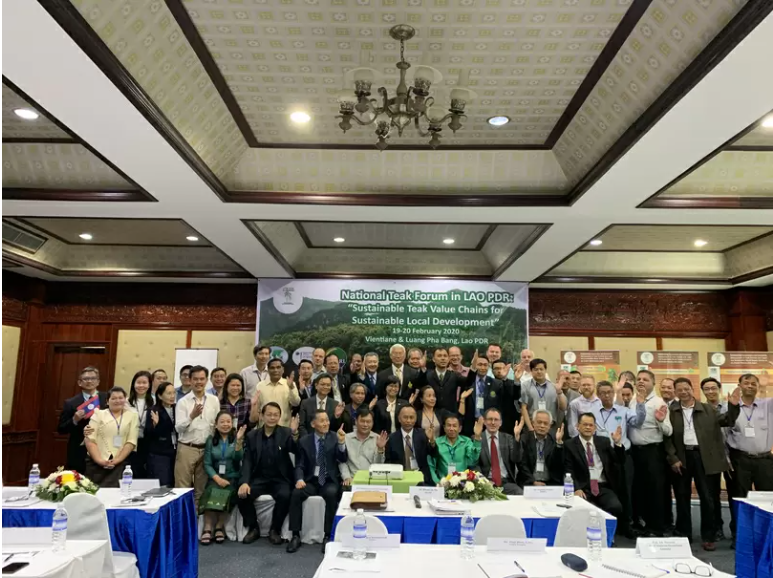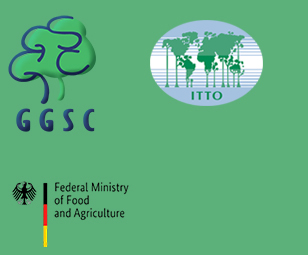
Smallholder teak plantations have the potential to be a driver of sustainable development in the lower Mekong by improving the livelihoods and landscapes of rural communities. Knowhow, high-quality planting material and a little financial support are keys for realizing such potential, according to participants at a meeting on teak held in the Lao People’s Democratic Republic in February.
About 50 participants in the Lao Teak Forum: Sustainable Teak Value Chains for Sustainable Local Development reviewed opportunities and challenges for sustainable teak value chains in Lao PDR. The forum was co-organized by ITTO in cooperation with Lao PDR’s National Agriculture and Forestry Research Institute and with financial support from the German Federal Ministry of Food and Agriculture (BMEL). It convened in Vientiane and Luan Prabang, Lao PDR, on 19–20 February 2020.

Participants on the opening day of the Lao Teak Forum, Vientiane, Lao PDR. Photo: Lao PDR’s National Agriculture and Forestry Research Institute.
Teak is a native species in Lao PDR, with natural teak forest covering an estimated 68 500 hectares. Moreover, teak plantations established by the private sector and rural communities cover about 36 000 hectares, mainly in the provinces of Luang Prabang and Boeko. According to forum participants, the creation of smallholder teak groups will enable the integration of farmers into supply chains for higher value-added teak products.This will be crucial for tapping into high-value markets, such as in Europe.
“In Germany and in other parts of Europe, [teak] is still highly valued and continues to have a great potential on the timber market, provided its legal and sustainable origin can be securely verified,” said BMEL’s Stephan Wagner in his opening remarks at the forum.
Forum participants noted that smallholders often require land-tenure assurance, technical knowhow, high-quality planting material at a low cost, financial incentives and appropriate policies to support value-adding. The forum made the following recommendations:
1. Secure land tenure and titles.This is essential for ensuring thriving teak plantations. Moreover, supportive tenure policies will be more effective when they reduce the regulatory burden on small-scale plantations by simplifying rules and regulations on the harvesting, transporting and sale of teakwood. Developing a simplified mechanism to include smallholder plantations under REDD+ and giving farmers carbon incentives would encourage the establishment of more plantations.
2. Promote innovative certification systems for smallholder teak plantations and reduce high transaction costs.Forest certification has become increasingly important for timber with strong demand in international markets, such as teak, but smallholders are unable to bear the high transaction costs involved in existing certification systems.The certification of smallholder teak plantations by local authorities, such as the scheme in operation under the Luang Prabang Teak Programme, could help in demonstrating the legal origin of planted teakwood.
3. Increase the productivity and quality of smallholder teak plantations by using high-quality genetic material and appropriate techniques.The provision of training and extension for smallholders ingood silvicultural practices such as appropriate spacing, pruning and thinning, and a supply of high-quality genetic resources, could significantly improve the productivity of plantations and the quality of teakwood.
4. Create smallholder teak groups for effective value chains.Groups such as those in the Luang Prabang region help smallholders work together to add value to teakwood and to leverage their dealings with local lending institutions to obtain credit and soft loans. Such groups should be replicated elsewhere in the country, and smallholders could be further incentivized by tax breaks.
5. Promote value-adding from pruning and thinning.Returns from thinning are important for smallholders, and no part of teakwood should go to waste. Training on wood-processing technologies and handcraftsmanship could improve the local manufacture of teak furniture and do-it-yourself wood products while creating rural jobs.
6. Enhance networking between growers, processors and traders as well as public–private partnerships.Facilitating communication and information-sharing will strengthen teakwood supply and value chains in the region.
The Lao Teak Forum was conducted as part of the ITTO project,Enhancing conservation and sustainable management of teak forests and legal and sustainable wood supply chains in the Greater Mekong sub-region[PP-A/54-331], financed by the Government of Germany through BMEL. Project partners include Cambodia’s Forestry Administration, Lao PDR’s National Agriculture and Forestry Research Institute, Myanmar’s Forest Department and Forest Research Institute, the Thai Royal Forest Department and Kasetsart University of Thailand and the Vietnamese Academy of Forest Sciences.
BMEL’s Stephan Wagner said that the Government of Germany was supporting the upscaling of efforts to ensure a secure future for teak as a precious tree and timber species.
“It is our hope that ITTO, by linking the project activities and lessons learnt with those of the global teak network, can promote capacity building and know-how transfer even way beyond the project itself,” he said.

| E-mail:ggsc@itto-ggsc.org | Téléphone:86-10-62888626 |


Contactez-nous |
|